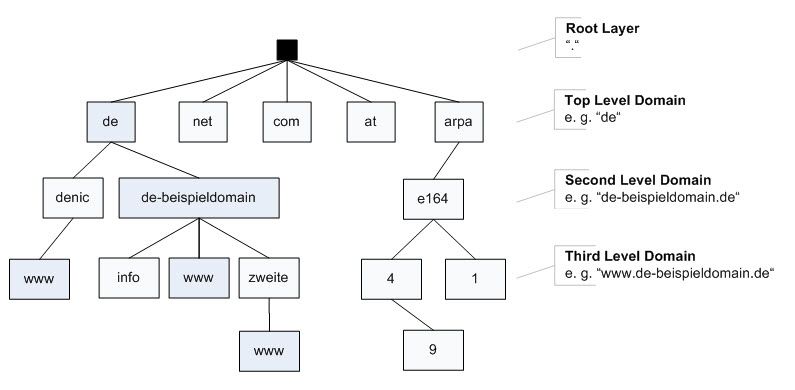The Domain Name System (DNS) - The Telephone Directory on the Internet
The Domain Name System is a directory service on the Internet. It is like a telephone book distributed across the world, in which one or several telephone numbers (IP addresses) are listed for a name. Providing this service, the DNS is an indispensable prerequisite for reaching services on the Internet (such as online shopping or online travel booking). Because only the DNS enables a user to get access to a particular website by entering an URL like https://www.denic.de or to send an e-mail to info@denic.de.The participants on the Internet are computers. To be able to communicate with each other, each computer has a unique IP address, such as 192.0.2.122 or even 2001:db8:85a3::8a2e:370:7334. The DNS will map the ULR (e.g. www.denic.de) the user has entered to this combination of numbers.
DENIC is responsible for ensuring that all domains with the ending .de, which is the country code for Germany, are available fast, at any time from any place in the world. To provide this service, DENIC operates a globally distributed network of servers, the so-called name servers.
How Does the DNS Work?
The Domain Name System is a redundantly operated, hierarchical, and decentralised system for the administration of names. It shares out responsibilities and ensures the uniqueness of the names on the separate hierarchical layers. This is done through a tree-like structure, known as the "name space". The tree's "root" divides into various branches, the familiar Top Level Domains, such as .de, .net or .com. These branch out further into so-called Second Level Domains, and so on and so forth (see Figure).
The DNS, however, does much more than just linking computer names to IP addresses. It can also be used for saving and retrieving further information about the services linked to a domain. A DNS query is able to find out, for instance, which computer acts as the e-mail server for the domain concerned or what a domain's name servers are called.
